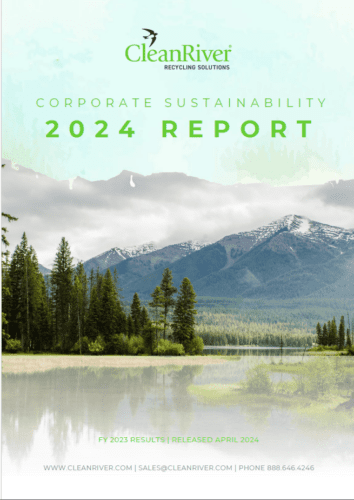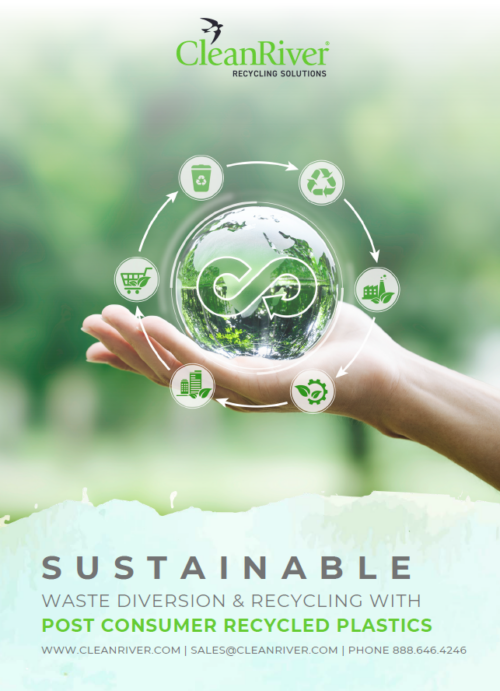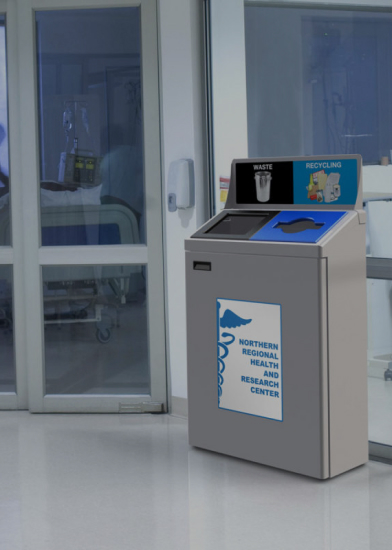Sustainibility
Sustainability at the Core: Our Commitment to Environmental Stewardship
At CleanRiver sustainability is more than just a buzzword. It’s a fundamental philosophy that guides everything we do.
We are deeply committed to environmental stewardship, practicing green manufacturing, and prioritizing the use of recycled materials. Our values reflect our dedication to creating a greener future and setting an example for sustainable business practices.
Download our PCR Brochure
GOT WASTE DIVERSION GOALS?
START WITH PCR PLASTIC BINS.
What is PCR Plastic?
PCR plastic is derived from plastic waste that is collected and processed into pellets to take on a totally new form and purpose as a manufactured good.
Choosing bins made of Post Consumer Recycled plastics (PCR) is a solid and sustainable cornerstone of every results-driven waste diversion and recycling program. It is also a very noteworthy and responsible way to divert waste from landfills and oceans, while actively participating in the growing circular economy.
Mini Bin™ Program
Mini Bins are, just as they sound, small containers that are used in place of standard waste receptacles.
The CleanRiver Mini Bin™ Program gets people to think more about what they’re about to throw out. And since most of the waste generated in offices is recyclable, Mini Bins have proven successful in reducing waste going to landfills and increasing materials that get recycled. The bin may be small, but the impact is big.
This program has proven to divert up to 70% of waste from landfills during pilot programs. The Mini Bin™ Program is an effective solution for creating a more sustainable and environmentally friendly workplace.
Green Manufacturing
CleanRiver Recycling Solutions is a pioneer in green manufacturing. We go above and beyond to reduce our ecological footprint by using materials with high recycled content and continually improving our processes.
Our facility boasts a zero waste diversion rate of 97%, and we recycle any scrap materials generated during manufacturing.
The plastic lumber debris collected during our manufacturing process is shipped back to our supplier who then regrinds the chips and recycles them into new plastic lumber, closing the loop on a complete cradle-to-cradle (C2C), waste-free life cycle for our recycling containers. We also installed a series of chip extraction systems to collect shavings from our manufacturing process. The shavings are collected in a hopper and transported back to numerous manufacturers to be recycled into other goods.
By choosing our products, customers can trust that they are supporting a company dedicated to sustainable and environmentally responsible practices.
The recycling program with small size and big impact!
An average North American office worker will generate 2.2 lbs. of waste per day. Unfortunately, without a proper recycling program, most of this winds up in the trash even though, on average, 80% or more is actually recyclable! The CleanRiver® Mini Bin solves that problem by replacing your tradition desk-side trash can with the five-and-a-half inch tall Mini Bin to collect landfill waste. When you remove a standard size garbage can and replace it with the 1.5L (0.4 USG) Mini Bin, workers have no choice but to think before they toss. This recycling program creates a much more environmentally friendly office and can even save or generate money, depending on your waste contract.
Mini Bin Features:
- Material: 100% Recycled polypropylene plastic.
- Standard colors: Black & Green.
- Standard imprint: “This is all the GARBAGE I make!”
- Comes with its own implementation guide.
- Optional Mini Bin bags and liners.
- Liner Dispensers keep bin liners organized.
- Custom imprints available for your recycling slogans or organizational brand.
The Mini Bin has been adopted by hundreds of companies and institutions across North America, and has, in some cases, diverted as much as 70 percent of waste from entering landfills during the pilot program alone! You can
order your Mini Bins online or for more information on how the Mini Bin program can work for you feel free to
contact us!
Emerging Trends in Waste Management
As recycling evolves, and mandates change, we are seeing a switch in thinking from waste as something that is sent to landfill or burned, to waste as an asset that is sold and repurposed or reused.
As more organizations strive for zero waste, we are also seeing the need for new collection streams such as e-waste, organic collection and single stream collection. And as new streams develop, there is also a need for new recycling container graphics. We are constantly developing innovations to keep up with emerging trends, so whether you’re implementing a new recycling program or improving an existing one, we can help with our industry-leading products as well as our passion and expertise to make your program succeed.
Project Nest Box Program
Project Nest Box connects students with nature by supplying bird nest boxes made from recycled plastic, to K-12 schools across North America. Students monitor the nests bi-weekly from April to July, and report data to Bird Studies Canada’s Project NestWatch. Students learn more about different bird species, while gathering important information. So far, over 1000 bird nest boxes have been donated.
A limited number of free bird nest boxes are distributed every spring.
-
Recycling Container Graphics

 From showing people exactly what goes where, to communicating your sustainability message, graphics can be a powerful component of any recycling program. CleanRiver has developed new and innovative ways to use graphics such as diorama graphic displays that showcase the actual waste generated, or branding for recycling programs to take pride and ownership. Talk to us about custom graphics that can help your program make a bigger impact.
From showing people exactly what goes where, to communicating your sustainability message, graphics can be a powerful component of any recycling program. CleanRiver has developed new and innovative ways to use graphics such as diorama graphic displays that showcase the actual waste generated, or branding for recycling programs to take pride and ownership. Talk to us about custom graphics that can help your program make a bigger impact. -
Single-Stream Recycling
Single-stream recycling is the collection of all recyclable waste together. For example, this means soda cans, plastic bottles and newspapers can be collected altogether in one bin. Single-stream recycling aims to divert more waste from landfill by making it easier for people to recycle their waste. There’s less decision making required because people don’t need to sort their recyclables. However, single-stream recycling has sparked many discussions and debates over how effective it really is within the recycling industry.

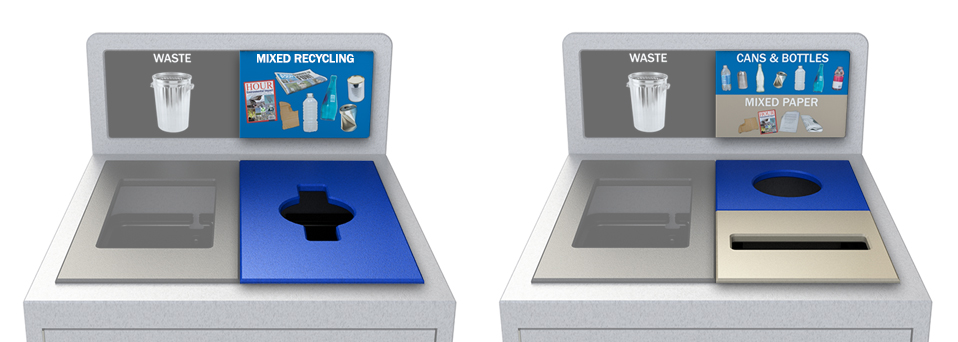
The container on the left collects all recyclables together while the container on the right collects cans & bottles and paper separately.“What we found [over the years] was that single stream is often reported as having the highest collection volumes … but it´s not just the amount collected. It´s how much actually makes it into a manufactured product at the end of the day. With those higher contamination levels, the costs are higher for the mills and reclaimers, so of course the mills and reclaimers pay less for the output of single‐stream then they do for cleaner materials.”
– quote by Susan Collins, executive director of the Container Recycling Institute (CRI)Here’s a list of the top advantages and disadvantages of single-stream recycling to help you decide what’s best for your organization.
Advantages
- Increases recycling program participation because it’s a simple system. All recyclables are collected together so people don’t have to spend time deciding which bin to toss their cardboard cup, newspaper or soda can into.
- Easier for custodial staff to collect recycling in one bin at the back-of-house rather than sorting the bags into different front end loaders/dumpsters.
- Opportunity for organizations to reduce their waste hauling costs through contract negotiation and streamlining collections.
- Streamlined waste hauler collection of recycled material. They just pick up the full recyclables bin when ready rather than collecting sorted recycling in different bins on a scheduled pick up.
- Municipalities have seen a significant increase in the volume of recyclable waste being collected in single stream programs. A 2002 study in Minnesota found that 21% more recyclables were collected in single-stream programs.
- The increased volume of recyclable waste being collected diverts more waste from landfill.
- Provides a great opportunity for organizations to increase their diversion rates because the program is simple for people to use and so collects more recyclable waste.
- It’s widely accepted in the recycling industry that collection costs are reduced for municipalities who have single-stream curbside programs. This is due to the decrease in the frequency the collection trucks need to be unloaded and the ability to standardize the fleet.
- A 2007 presentation by the Solid Waste Association of North America (SWANA) stated that collection savings from single stream were $10-20 per ton.
- Municipalities can collect more material with less labour costs; they can reduce the number of employees and improve route efficiency.
Disadvantages
- Recyclables arrive at the Material Recovery Facilities (MRFs) unsorted resulting in increased processing costs because the MRFs have to sort the recyclables before they can sell to the market.
- Mixing recyclable items together reduces the market value due to contamination. The value of paper for example reduces significantly if it’s contaminated by liquids or other items.
- Contamination can also affect the ability of the recycler to produce quality end products. For example if paper is not properly separated into different grades at the MRF and is then delivered to the Mill, the recyclable newsprint could contain some old corrugated cardboard (OCC) which when processed together will result in reduced quality newsprint. This can lead to lost revenue costs for the mills if their newsprint is not good enough quality.
- Contamination can also cause equipment failure for recycling plants and mills which leads to lost productivity and expensive repairs.
- Studies have shown that while single-stream MRFs take in a greater volume of recyclable material compared to dual stream (or source separated recycling), they send a smaller volume out for recycling due to the contamination.
- Unwanted contaminants are sent by the recycler to landfill disposal. This means a plastic bottle that was put in the recycling bin could end up as landfill because it was sorted out as a contaminant at the paper mill.
- On average only 40% of glass from single-stream collection is recycled into glass containers or fibreglass compared to 90% for dual-stream and 98% for bottle-deposit programs. This is because glass gets easily broken in single-stream collection and is then hard to separate at the MRF. Broken glass is usually downcycled into things like sandblasting base or aggregate material and this is less desirable in terms of recycling’s goal for reducing energy conservation and avoiding emissions.
- A large proportion of North America’s recyclables were being shipped to China for sorting and processing into raw materials due to cheaper freight and inexpensive labour.
Reference Links
-
Organics

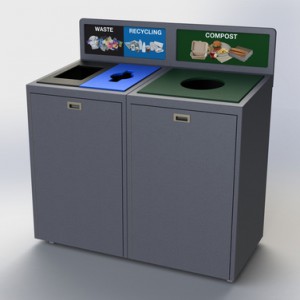
According to the EPA (US Environmental Protection Agency) organic waste makes up the third largest category (14%) of the trash in landfills where it decomposes to produce methane gas – the leading contributor to global climate change.
As part of their waste management plans, many cities across Canada and the Unites States are enforcing the collection of organic waste in their goal to divert more waste from landfill. Metro Vancouver introduced mandatory organics collection for all residential, non-profit and business buildings in January 2015. Significant fines may be incurred if organic waste is detected in their landfill trash.
Benefits of collecting organic waste
- Organic waste is a valuable resource that can be composted to produce soil fertilizers to enhance soil quality and reduce soil erosion.
- The collection of organic waste considerably increases an organization’s diversion rate and can help you to reach zero waste.. For example, collecting paper towels in your washroom can dramatically increase the amount of waste you divert from landfill.
What you should be collecting:
- Food scraps
- Paper towels and napkins
- Coffee grinds & tea bags
- Cardboard sleeves from hot beverage cups
- Compostable plates and cutlery
Benefits of Compostable Foodservice Ware
- Compostable cutlery takes about 6 months to fully breakdown.
- Using compostable plates and cutlery in cafeterias and meeting rooms makes it easy for people to dispose of their waste correctly because it removes the need to sort. They can simply toss the plate and food scraps into the one organics collection bin.
- Compostable foodservice ware is helping the world’s busiest airport in Atlanta, Hartsfield-Jackson International Airport reach their diversion rate goal of 50% by 2015.
- Compostable cutlery, plates and take-out boxes made from plant fibres or compostable plastic are now more readily available and competitively priced than ever before.
As municipalities start to see the benefits of composting a large proportion of their waste, we will start to see organics collection programs spreading across the towns and cities in North America. Curb side organics collection will start to become a standard alongside Blue Box recycling programs.
If you’d like any information or assistance in setting up organics collection in your facility, please don’t hesitate to call us at 1-888-628-5756 or email solutions@cleanriver.com
-
Electronic Waste
As technology evolves and obsolete electronic products need to be replaced, electronic waste collection is becoming an important component of recycling programs. Most of CleanRiver’s recycling stations can be configured to accommodate e-waste, and we’ve recently developed the Ebin that collects multiple, low volume streams in a compact footprint. Most e-waste containers are lockable, with custom graphics, and custom openings to prevent theft of valuable items.
Sustainability at the Forefront: Community Initiatives
CleanRiver is dedicated to promoting sustainability and environmental stewardship through various community initiatives.
We actively engage with K-12 schools through Project Nest Box, providing recycled plastic bird nest boxes and fostering students’ connection with nature.
Our TRUE Certified Zero Waste Advisors demonstrate our commitment to high standards and offer expertise in zero waste strategies.
We contribute to community tree planting events, having planted over 3500 trees in our hometown.
Our founder’s involvement in environmental organizations showcases our dedication to conservation and resource efficiency in promoting a circular economy.
